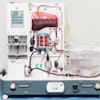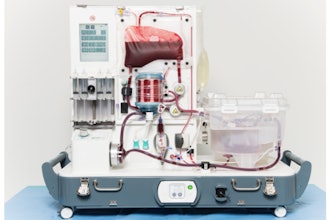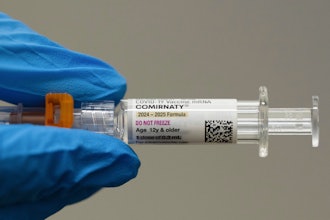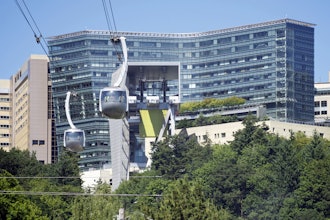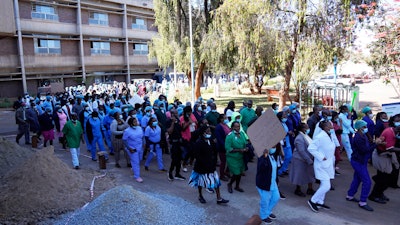
HARARE, Zimbabwe (AP) — Striking nurses and other health workers have brought Zimbabwe's government hospitals to a near standstill, straining a once vibrant public health system now plagued by a lack of medicines and basic supplies such as gloves.
The health professionals stopped working Monday after rejecting the government's offer of a 100% pay rise which they say is inadequate to meet their needs amid skyrocketing inflation of 130%.
Health workers want to be paid in United States dollars because salaries in local currency are being eroded by inflation, Zimbabwe Nurses Association president Enock Dongo said. Most health workers are taking home less than $200 a month, he said.
“We are hungry … the situation is no longer sustainable. Health workers are walking to work because they can’t afford bus fare. Everything is benchmarked in U.S. dollars except our salaries,” said Dongo.
Dozens of nurses in uniform, some doctors wearing stethoscopes around their necks and other health workers marched, sang and chanted at Parirenyatwa Hospital in Harare, one of the country’s largest public hospitals. Others carried placards reading “Bring back our dignity.”
Similar strikes were taking place at other hospitals across the country, said Dongo.
Desperate patients sat in the hospital parking lot or on the hospital grounds with little hope of getting help.
“I slept here but no one is attending to me. The nurses and doctors say they should be paid more money before they can treat me,” lamented Tobias Shavane, who said he was injured in a traffic crash on Monday. A dirty bandage served as a sling for his arm while his swollen hand was strapped to a blood-stained piece of a cardboard box.
“They told me my situation is not an emergency. I have nowhere else to go because I can’t afford to go to a private hospital,” said Miriam Matembo, who brought her 11-year-old daughter who was suffering from stomach pains. The girl lay on ground, visibly in pain. “I may just have to return home with her, or visit a prophet.”
Unions representing teachers have announced that they intend to strike, also demanding payment in U.S. dollars. President Emmerson Mnangagwa's government says it's not able to pay in greenbacks.
In addition to offering all civil servants a 100% pay increase in local currency, the government says it is negotiating with bakers to try to reduce the price of bread, which, like other basics such as cooking oil and gas, is now out of reach for many people.
Russia's war in Ukraine is blamed for increasing fuel and food prices. Since the start of the war in Ukraine, Zimbabwe’s inflation rate has nearly doubled, according to official statistics.
Many fear Zimbabwe could return to the hyperinflation of 2008 which reached 500 billion %, according to the International Monetary Fund. That economic catastrophe forced the government to adopt a multi-currency system in 2009 in which U.S. dollars and the South African rand were accepted as legal tender.
The U.S. dollar continues to dominate as prices in local currency are often benchmarked to the rates for the American currency on the flourishing illegal market, where most individuals and companies get their foreign currency.
Zimbabweans who earn in local currency such as government workers must source dollars on the illegal market to pay for goods and services that are increasingly being charged in U.S. dollars.
Retailers said the rising rates for U.S. dollars on the illegal market are forcing them to frequently increase prices, often every few days, to allow them to restock.



